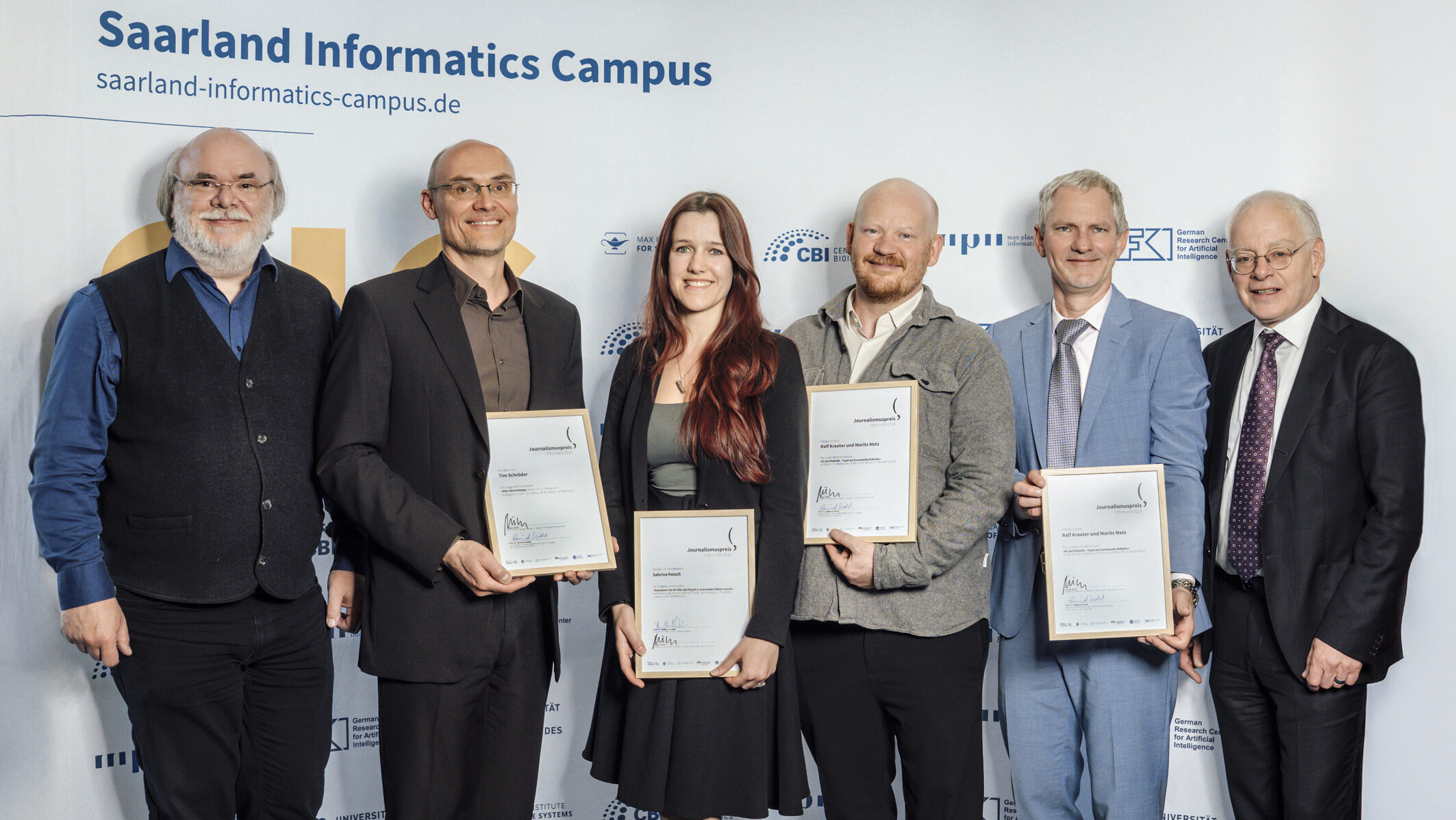Saarland Ministry and Informatics Campus Honor Outstanding Journalism in Computer Science

DFKI site director Prof. Philipp Slusallek, award winner Tim Schröder, Dr. Sabrina Patsch, Moritz Metz and Ralf Krauter with Minister Jürgen Barke (from left to right), © Photo: Manuela Meyer
The Saarland Ministry for Economic Affairs, Innovation, Digitalisation and Energy, in collaboration with the Saarland Informatics Campus (SIC), has awarded the 2024 Journalism Award for Computer Science. The German Informatics Society serves as an institutional partner.
This year’s winners include a Deutschlandfunk podcast episode, an article from “mare – The Magazine of the Seas”, and a feature published in “c’t”, a leading German tech magazine. Established in 2006 and endowed with a total of €16,000, the award recognizes excellence in communicating computer science topics to the public. Main prizes in the three categories — Text, Audio, and Video/Multimedia — are each endowed with €5,000 and funded by the Saarland Ministry. Additionally, the German Research Center for Artificial Intelligence (DFKI) awards a €1,000 Special Prize.
Jürgen Barke, Saarland’s Minister for Economic Affairs, Innovation, Digitalisation and Energy, and patron of the award, states:
“With the Journalism Award for Computer Science, we honor reporting that explains technological developments in an accessible way. The awarded pieces demonstrate how solid journalism can make complex subjects like digitalization and AI understandable, helping readers and listeners place developments into context. My heartfelt congratulations go out to all the awardees for their outstanding contributions. Their work enhances public understanding of technological change and supports society and policymakers in shaping it responsibly.”
This year, the jury reviewed 66 submissions. The panel consists of:
Peter Bylda (longtime editor at Saarbrücker Zeitung and now freelance journalist),
Peter Hergersberg (MaxPlanckResearch),
Isabel Münch (Fellow, German Informatics Society),
Dr. Wolfgang Pohl (Managing Director, German Informatics Competitions),
Florian Possinger (Saarländischer Rundfunk),
Vera Sikes (Department Head at the Federal Office for Information Security (BSI), Head of the BSI Saarbrücken site),
Dr. Christel Weins (scientist and co-founder of the award),
Peter Welchering (freelance science and tech journalist),
Prof. em. Dr. Dr. h.c. Reinhard Wilhelm (Computer Science professor at Saarland University and former Director of Schloss Dagstuhl – Leibniz Center for Informatics).
Awarded Contributions for 2024
- Text Category – Main Prize (€5,000)
“Alles Berechnung” by Tim Schröder, published February 1, 2024, in *mare – The Magazine of the Seas*
Available as a PDF on this website and also via mare online.
Jury Statement:
Virtually no field of science can do without developments in computer science today — especially AI methods are increasingly used. In his article “Alles Berechnung”, zoologist and journalist Tim Schröder explores a lesser-known application: the use of AI in marine research. He clearly illustrates how image recognition algorithms have become indispensable tools to identify animals and plants — up to a thousand times faster than humans. Schröder compellingly describes how researchers use AI to monitor coral reefs, track animal populations, and investigate marine pollution. Particularly noteworthy is how he gives voice to both computer scientists and marine researchers, providing rich insights from both fields. The article stands out for its objective tone, clear contextualization, and comprehensible presentation — a prime example of in-depth science journalism at the intersection of technology and the environment.
- Audio Category – Main Prize (€5,000)
“AI and Robotics – The Hype Around Humanoid Robots” by Ralf Krauter and Moritz Metz, published September 26, 2024, in Deutschlandfunk’s “Understanding AI” podcast series. Produced by Maximilian Brose.
Available at: https://www.deutschlandfunk.de/ki-robotik-hype-humanoide-roboter-dlf-f5fe8c77-100.html
Jury Statement:
In their award-winning episode, Ralf Krauter and host Moritz Metz explore the current state of humanoid robot development. They debunk marketing myths, take listeners behind the scenes of development work, and highlight both progress made and ongoing challenges. With expert commentary, they explain central concepts in robotics and AI — including complex developments like vision-language-action models — in a clear and accessible way. The hosts’ relaxed, engaging style opens the topic to a broader audience. This is a compelling piece of journalism that demystifies technology, tempers expectations, and fosters critical reflection.
- Special Prize by DFKI (€1,000)
“Nobel Prize for AI?” by Sabrina Patsch, published November 5, 2024, in *c’t* and on *heise online*
Available at: https://www.heise.de/hintergrund/Physik-Nobelpreis-Wie-viel-Physik-in-neuronalen-Netzen-steckt-10001801.html
Jury Statement:
When the 2024 Nobel Prize in Physics was awarded to two scientists for their contributions to neural networks — a milestone in machine learning and AI — it drew surprise and sparked discussion. In her article “Nobel Prize for AI?”, Sabrina Patsch retraces this unusual decision with clarity and journalistic precision. She tackles a highly complex topic that even specialists struggle to explain in simple terms — as laureate Geoffrey Hinton himself admitted. With a light touch, Patsch writes she’ll “give it a try anyway” — and succeeds in vividly conveying the connections between AI and modern physics, even within the constraints of a magazine format. The article demands the reader’s full attention but remains accessible to an interested lay audience, offering a nuanced and careful analysis of a remarkable scientific and societal event.
No prize was awarded in the “Video and Multimedia” category this year.
About the Saarland Informatics Campus
With around 1,000 researchers and 2,800 students from more than 81 nations, the Saarland Informatics Campus (SIC) is one of the leading locations for computer science in Germany and Europe. It brings together four world-renowned research institutes — the German Research Center for Artificial Intelligence (DFKI), the Max Planck Institute for Informatics, the Max Planck Institute for Software Systems, and the Center for Bioinformatics — as well as Saarland University, whose three interconnected departments and 24 degree programs cover the full spectrum of computer science. https://saarland-informatics-campus.de
Editor:
Philipp Zapf-Schramm
Max-Planck-Institut für Informatik
Phone: +49 681 9325 5409
E-Mail: pzs@mpi-inf.mpg.de
